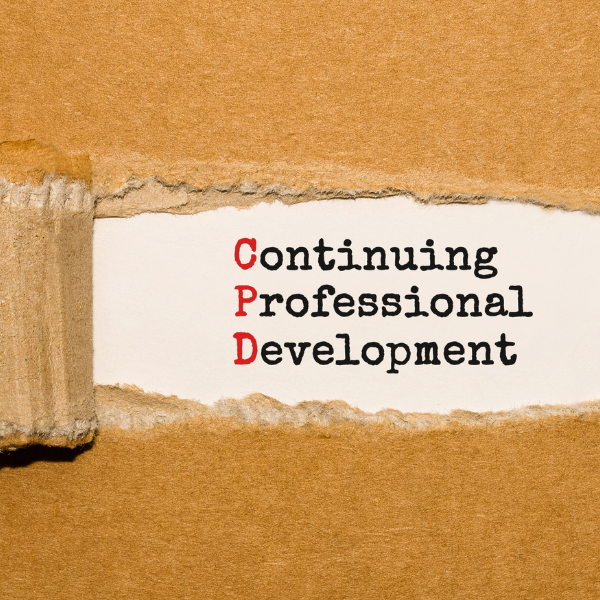All Things Admin Joins ASAP. Learn More ›
Why Tech Training Matters
November 26, 2024

Microsoft and cybersecurity experts share what administrative professionals need to know in today’s increasingly AI-driven world.
Recorded at SHRM 2024 and produced by the American Society of Administrative Professionals - ASAP. Learn more and submit a listener question at asaporg.com/podcast.
Download this episode for later and make sure to leave us a 5-star review on Spotify and Apple Podcasts!
Transcript
[music playing]
Leah Warwick: Hi, everyone. I'm Leah Warwick, and you're listening to "The Admin Edge." In the first two episodes of this season, recorded at the HR event SHRM, we emphasized the importance of soft skills, but we also know here at ASAP that staying on top of technical skills is equally important. In this episode, we talked to two tech professionals. First up is Jeff Peterson, Microsoft Solutions Advisor at Spindustry. I started by asking Jeff about how admins should approach their organizations to adopt Microsoft's latest AI tool, Copilot.
00:00:42
A lot of our members tell us, "Well, I want to learn Copilot so I can then present a business case to my company to say, we should be using Copilot."
Jeff Peterson: Right. And there certainly is a business case to be using Copilot AI. But from the Spindustry standpoint, we do think organizations should take a slow approach to this. The first thing we need to do is data governance. You want to make sure that your data has good data hygiene so that you're not having Copilot AI pull up old data that you don't want it to feed back information from. Maybe you've got old policies, maybe old SOWs, old information, and Copilot AI is going to be going through your data, helping you make those decisions, and it could be incorrect information.
Or maybe your permissions and your security isn't set up in your data now, and Copilot AI could go out and find information. Well, that could lead to other employees finding out things maybe they shouldn't find out. Data is sensitive, and you may not have permissions for everything, or at least you didn't know you had permission until Copilot AI said that you did. Like, "Hey, I didn't know I had access to this."
00:01:50
So we really make sure that organizations go through our governance, which is planning, going through the data, making sure everything is ready, and then it's the training for Copilot AI. We do that as well, making sure people understand how to use Copilot AI to increase efficiencies and productivity, and just really make sure that they're using it in the best way to really get the job done. That's what it becomes is a personal assistant.
Leah Warwick: Exactly, a personal assistant for assistants is very intriguing for our community because –
Jeff Peterson: We wear a lot of hats.
Leah Warwick: Exactly, they wear a lot of hats, overloaded with work a lot of the time, and they want to be more strategic in their work, in many cases, so using something like Copilot is a way for them to free up more time, often to do more of the work that they want to do. Not a lot of people love spending all of their time digging themselves out of an inbox or in a calendar or doing things that could be automated in some way.
00:02:44
But, in addition to Copilot, there's Power Automate. There's a lot of options to be more efficient in Microsoft. So, what would you say are some of the top skills that an administrative professional should focus on in Microsoft to be most effective?
Jeff Peterson: It's just like you were talking about, the automated workflow. Obviously, learning SharePoint is super important for anybody that wants to be more efficient, because once you've learned SharePoint and Microsoft Teams as well, you can begin branching out into Power Automate and Power apps, and utilizing those content types, all the metadata that you're putting into SharePoint to be able to start constructing some of those automated workflows.
Say a lot of HR are doing onboarding and there's a lot of tasks and hoops to jump through, and make sure people are following the path and they're checking up on people, sending the emails, going through lists. Well, SharePoint and the tools with Microsoft 365 can automate that. It can send out the notifications and it can take a new employee through the onboarding process so that an HR person isn't tied up, trying to chase people down to get a process done. SharePoint can do that. I think learning that first is super important.
00:03:53
And then once you have that skill, then it's like, "Okay, what else do you want to do? Let's start setting up your environment so you have that personal assistant, so that you can begin doing more important things, instead of pulling up an Excel document to see when a contract is due, and then notifying somebody, because SharePoint can do that, too. There's no reason you'll ever have to open up an Excel document again to find out when a contract is due and who to email and notify them yourself. That shouldn't be your job anymore. You should be doing more big-picture things to drive efficiency and, ultimately, profit.
Leah Warwick: Absolutely. And something we've heard at this conference, which is also an upcoming issue in our community, is we have a retiring workforce. We have people who need to become leaders. And to become a leader, you have to be a big-picture thinker and get out of putting things into spreadsheets and all of these manual tasks that used to take up people's whole days, and now, with a few simple clicks, can take just a few minutes. That's really important to get people into more leadership roles.
00:04:52
Jeff Peterson: And I think there's a lot of fear that, "Oh, wow, this could take my job if I use this." That's not the case. You're going to find more and greater things that you can do to help really drive the success of your company, once you get rid of the day-to-day, boring tasks that you're doing that are essentially driving people nuts. Really [like], "I should be doing something else, but I'm tied up doing this when I could be doing that."
Using your tools in Microsoft 365 is the way out of that, where you could really save a lot of time, and do things that are going to make you feel more enriched at work and like you're really making more of a difference, I think.
Leah Warwick: Yes, and time management is huge. People we've talked to already on this podcast at this event, just on the show floor, have talked about how time management is one of the most important skills an administrative professional can have, and that can be engineered through a lot of the tech we have these days. You can learn how to better manage your time through things you can automate, things you can be technically proficient in.
00:05:53
Jeff Peterson: Think about how many organizations have data in third-party sources and they're having to pull from here and there and here. With SharePoint, you can pull all of that information in SharePoint and then, with Power BI, be able to analyze all of that data. SharePoint works with APIs to connect to all sorts of different programs that are out there. Maybe you're using the mundane and you're like, "Well, I don't know. We don't need this. We've got the mundane. We're paying for this." Well, you could still use that, but it ties into SharePoint.
Leah Warwick: That's a great point, how Microsoft can integrate into a lot of different things and how you can use – I don't think a lot of people know those things. Do you train on that, too?
Jeff Peterson: Absolutely, yeah. Our main process is governance first, which is always the plan for SharePoint, getting that implemented, and then once you've got SharePoint implemented, it's about getting the data over, migrating that data into the right places so you can take advantage of content types, the metadata, making sure your data has gone into the right libraries.
00:06:50
We do a thorough plan. It's not advised to take your data from a shared drive to drop it into SharePoint. You need to plan that out first, and that's what our experts do. They plan out where the data needs to go. Once that's in place, then it's about the training, making sure everyone understands, from the admins to the end-users, the power-users, the ones that are going to be making the sites.
Everyone gets a different level of training. Whether you need expert training because you're the admin, or you're just going to be a user, we handle all of that. We can do it in different ways. You could be almost a kindergarten teacher, teaching someone that doesn't know anything to a college professor teaching the expert. Our certified trainers can do all of that.
[music playing]
Leah Warwick: Now let's hear from our second and final guest for this episode, John Just. John is the Chief Learning Officer at KnowBe4, which provides cybersecurity awareness and compliance training. John begins by sharing a bit about what he's learned here at SHRM.
00:07:52
John Just: So we're very involved with HR organizations these days to help protect not only the organization but individuals themselves. A lot of our organizations, if you get attacked, unfortunately these days you get attacked personally, too. I have some interesting stories to share that I just heard here at SHRM about what can happen and how that can impact you personally as well as professionally.
Leah Warwick: I would love to hear some of those stories if you don't mind.
John Just: Yeah, one of the more interesting ones recently was someone came by our booth and said it seemed like something was weird from one of the emails coming in, and they had actually had control of their system. They had downloaded an attachment. It looked like it was coming from one of their trusted vendors, the email, and they were able to spoof them. Then they downloaded that attachment. It took control of their computer, and what that allowed the cybercriminal to do is actually turn their direct deposit to their bank rather than the direct deposit that they normally get their personal paycheck in.
00:08:56
So not only did they compromise organizational information, but they were very slick about it. They were only taking out like $150, rather than – something you might not notice, right? Luckily, someone else had reported that email and said, "This seems suspicious," and they were able to trace it back and see who actually clicked on it. And before that ever got paid to the cybercriminal group, they were able to get it rectified because of training, and because we all have to kind of look after each other in this environment, right? And so, when they do these attacks, they usually send multiple attacks rather than just going after one person. Sometimes we might say, "Oh, it only takes one person to fall for it," but it also takes one person to report it to the organization that can save your colleague's paycheck from being diverted, that can save your organizational data from being exfiltrated and taken advantage of by cybercriminals.
00:09:52
Leah Warwick: One hundred percent. And while this is very important information for every worker to know, it is especially crucial for administrative professionals. We find that a lot of our community administrative assistants, executive assistants, have access to a lot of sensitive information, and sometimes they're working directly with an executive on very sensitive matters that could be easily hacked. So, what are some common ways that you see especially administrative professionals fall susceptible to some of these scams?
John Just: Yeah, so a big tip for administrative professionals is, when your folks that you're doing admin work for are on a trip or at a conference like we are here, the bad guys will monitor social media and recognize that they are away on a trip and will leverage that to start to say, "I'm at SHRM." How do they know they're at SHRM? Well, social media. We, as executives – I'm an executive myself – are trying to publicize we're here and we're learning about these various things, so they will publicize that.
00:10:52
Well, cybercriminals will read that [and say]: "I'm at a conference. I have spotty internet. Please make sure you send this money to this person," and engage with them. So that's one tip to be aware of: When people are traveling and things are posted to social media, be aware that that can be weaponized by the folks that are trying to get you to take some sort of action that can compromise the organization.
Leah Warwick: Yeah, so if they're at an event and they're posting about being at an event – can they still post about being at an event? And then what kind of security measures could they take around that, or should they not post?
John Just: To post or not to post is always the question, right, when it comes to cybersecurity. Things you should never post is a screenshot that has what operating system you have and what computer is in the background, or if you're taking pictures – and sometimes admins will be asked to take these pictures, right? So, they need to be aware of: What should I post and not post?
00:11:47
We have to post that we're going to conferences. We have to post that marketing information. But you don't want to post a screenshot that has in the background – "Oh, I can tell they have Windows. I can tell the little icon – that is what antivirus they have." That can be weaponized against you. I don't want to post anything that has my bank information or who I use for banking purposes, [such as], "Thanks, Merrill Lynch for all your support." So, it can be tricky, but there's definitely things. But it's also, be aware. The big thing is: Be aware that the cybercriminals are going to be looking at that as well, right? It's not about necessarily not posting everything, but it's being aware that that can be used. I think when people get tricked, they're like, "Well, how did they know they were at the SHRM conference?" Well, they knew because it's all over social media, and they're using that as open-source intelligence, and weaponizing it.
Leah Warwick: What about the deep-fake voices? Are you hearing more of the voicemails [where] they can do a deepfake of your CEO's voicemail?
00:12:46
John Just: Yeah, especially, again, if your CEO is out over YouTube and is out online, now they can take that audio and they can make a deepfake of it and then make that a voicemail message that's left that can back up the email that was sent. Not only that, but you're seeing multipronged attacks, what we call it. I'm sending a text message, I'm also sending an email, and I'm also leaving a voicemail. So, again, trust your gut. If something seems like it's off, even though you've gotten a voicemail or you've gotten a text message, it never hurts to verify. So many times, we hear people are happy that the person did verify as opposed to acting on that, even if it is an actual, legitimate, current claim and they need it done. Get that person live on the phone and be able to verify with them.
Leah Warwick: I've taken KnowBe4 training and one thing that really stuck with me was that: If you get a suspicious email or a suspicious voicemail or text, call the person. Call their actual number and say, "Hey…" Usually it does seem a little off. If you trust your gut, it does seem a little off. You have to call and say, "Hey, I got this email. Did you send this?" And that is the best way, to directly call them.
00:13:53
John Just: Always, yeah, with the number that's known because we've had people call the number that's at the bottom of the email, and that's going to the cybercriminals. Obviously, that could be problematic as well.
Leah Warwick: Absolutely. Well, since you're an executive yourself, I just can't resist asking: In addition to cybersecurity, what are some of the most common traits and skills that you think are most valuable in administrative professionals today?
John Just: I have the most amazing executive assistant. Shout out to Stephanie out there, who does an amazing job and keeps me organized and everything. There's no way I could handle the global team that I do right now without her assistance every day. She's learned a lot. Obviously, the basics are like she's a master email manager, and then she's a master calendar and time zone manager, but I think it's the soft things. A lot of people see me as the one who's got the hammer and they're afraid. I think her biggest skill is being available for the staff to speak to and then coming into my office and going, "Look, I've heard from three or four people about this one thing, and I think you need to… I don't know exactly what it is, but you probably need to clarify it, because it's not going down as well as you might think it is. I'm talking to the other admins of the other leaders. I'm talking to the other folks, and the word on the street is…"
00:15:12
I've had admins over the years. The people who can do that part (in addition to the hard skills), those sort of soft skills with the staff, that is invaluable to an executive because we're looking for that word on the street. We're looking for: How is this going down? It's a dynamic place. Things are changing. How do I get a great sense of what's going on out there, and how do I make a real connection? Admins can do an amazing job of doing that and helping us.
Leah Warwick: A hundred percent agree. We see the best admins out there and most of them, to be quite honest, are extremely skilled at working with people, just as much as with the technology that's required for their role.
Our whole thing is we want to provide role-specific training for administrative professionals. We have an event called EA Ignite that's just for EAs. There's the Administrative Professionals Conference.
00:15:59
For you, when you think about training for Stephanie or other admins, for their soft skills as an example, what kind of training do you think that they should have?
John Just: Well, we talked about AI and using AI and using it properly, because it's a blunt instrument. You can hit your finger with it, or you can hit that nail and you can do a really good job with it. I think knowing what the limitations are of AI, knowing what information I should put into AI and what I shouldn't, and how I can leverage it to make myself more efficient and make my team more efficient. How it can help is a huge skill that's going to be more important in the years to come, but I think is already here in terms of being able to do that. I would say, yeah, AI is a huge skill, and then continuing to build those relationships skills, those communication skills. We're never there. I'm never there as a chief learning officer, right? So, I need to continue to develop those skills over time, and I think everybody can grow in that area as well.
00:16:59
Leah Warwick: Absolutely. We have been diving really deep into AI skills, for sure, with generative AI, not only being careful about it, but being as efficient as possible with it.
John Just: Yes, leveraging it to help you. I know Stephanie, for my presentation that she helped me do, I said, "Here are some blog posts I've done. I'm basically going to do this." So, she gave them to AI – that's publicly available information – and said, "What would you do for an outline?" That started her off and it started us off, but it wasn't the end-all, be-all, like this is the outline she showed me. It was really just the outline that she started from, and it was more efficient than if she had read all of those herself and tried to pick out things. Where to use it, how to use it to make yourself more efficient, I think would be a great skill.
Leah Warwick: Yeah. It sounds like Stephanie is like a partner to you.
00:17:46
John Just: She definitely is, yeah, for sure. She's a business partner in what we accomplish, and she's amazing to be able to bounce things off of and, yeah, terrific. She does an amazing job.
Leah Warwick: That's great. Well, we love to hear that. Thank you for sharing. I have to say – big KnowBe4 fan. I think you do a great job, and I hope that you continue with all of the great success.
John Just: Thank you very much. Thank you for making time. This was amazing to be on here. Shout out to all the admins out there.
[music playing]
Leah Warwick: Thank you for listening to "The Admin Edge," produced by the American Society of Administrative Professionals. Original music and audio editing by Warwick Productions, with audio and video production at SHRM by 5Tool Productions. If you liked this podcast, please leave us a nice review, five stars, and subscribe. If you'd like to submit a listener question, you may do so on our website at asaporg.com/podcast.











